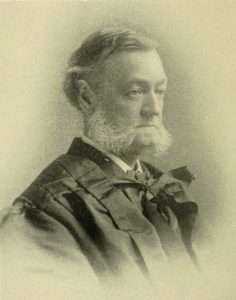The Volokh Conspiracy
Mostly law professors | Sometimes contrarian | Often libertarian | Always independent
Today in Supreme Court History: January 26, 1832
1/26/1832: Justice George Shiras Jr.'s birthday.

Editor's Note: We invite comments and request that they be civil and on-topic. We do not moderate or assume any responsibility for comments, which are owned by the readers who post them. Comments do not represent the views of Reason.com or Reason Foundation. We reserve the right to delete any comment for any reason at any time. Comments may only be edited within 5 minutes of posting. Report abuses.
Please to post comments


Crawford v. Nashville, 555 U.S. 271 (decided January 26, 2009): Title VII of the Civil Rights Act of 1964 forbids retaliation against an employee who makes an accusation of sexual harassment. Here the Court holds that it also protects an employee who reports sexual harassment only after being asked about it by the employer's agent as part of an investigation into the alleged harasser. (That's right: at a presumably confidential investigative interview she was asked if she'd heard about this guy harassing anyone, she said yes, and she got fired for it.)
Arizona v. Johnson, 555 U.S. 323 (decided January 26, 2009): warrantless patdown of passenger justified during Terry stop (expired registration) when answers and clothing gave indicia of gang membership (Crips) and defendant had a police scanner in his pocket (handy for a getaway car). The opinion contains a good, brief summary of traffic stop law that began with Terry.
United States v. Watson, 423 U.S. 411 (decided January 26, 1976): Postal inspectors can arrest you if you have stolen mail (or even for any felony, evidently even if unconnected with mail, 18 U.S.C. §3061(a)(2)). Here, the Court holds that an arrest in a restaurant did not need a warrant, after a "reliable informant" told the inspector that defendant possessed stolen credit cards. (My old girlfriend worked for the county Weights and Measures Bureau, going around in her uniform testing meat scales in stores, etc., and learned that technically she had the power to arrest people. She never did, of course, but it would have been fun to do her last day on the job.)
Draper v. United States, 358 U.S. 307 (decided January 26, 1959): warrantless arrest allowed where informant had described what train defendant would be stepping off of, what he would be wearing, the color of his satchel (which contained heroin), and that he would be walking fast
Shapiro v. Doe, 396 U.S. 488 (decided January 26, 1970): Court dismisses appeal of decision invalidating requirement that mother of non-martial children receiving welfare reveal the name of the man she was living with, because appeal deadline was missed by one day; Black and Douglas dissent, arguing that the Constitutional issues are important enough to invoke Court's power to overlook deadline in the interest of justice (I don't think the Court ever got another chance to address this question)
In Massachusetts, a defendant argued that he had been illegally arrested by transit system police for an offense unrelated to the transit system. The courts ruled that there was no such limitation in the authorizing statute. The Transit police can arrest for any reason other law enforcement officers can arrest, and can perform their duties anywhere in any of the nearly 200 cities and towns served by the MBTA.
From the Shapiro dissent: "Time defects such as this one involving only a failure to comply with the Rules of this Court do not rise to jurisdictional proportions and can be waived by the Court when the interests of justice so require." This anticipates by some decades the modern "jurisdictional" / "claim processing" distinction.
Thanks! As always, your posts add depth and interesting further information.
Yeah, and contrary to the law of the Dukes of Hazzard that I learned as a kid, police do not have to stop chasing you once you reach the county line.
In the case of The Dukes of Hazzard, you might remember that psycho sheriff in the next county. As Roscoe said after getting off the phone with him, “That man needs attention.”
But in the case of Sheriff Buford T. Justice, you’re perfectly correct. (What a fun performance to watch. From what I understand, Gleason ad libbed almost the entire part. The high point was the toilet paper gag.)
Once upon a time I was taught that the "hot pursuit" exception to jurisdictional limits only applies to felonies. I don't know if that is the general rule.
According to internet legend police in the speed trap town of Linndale, Ohio risked getting a ticket themselves if they chased speeders outside of city limits. Revenue police were unpopular with some real police. Different states have different customs. In some states it is expected that local police patrol major highways. In others it is discouraged.
A defense attorney in Massachusetts thought he had a get out of jail free card. Investigating the scene of the arrest he found his client had been pulled over in the wrong town. The officer was from Concord and the arrest was 20 feet or so inside of Lincoln. I think the officer hadn't passed the town line sign but he had passed the official boundary marker. On appeal, the courts said that was close enough for government work. In another missed boundary case the courts said they would treat the stop as a citizen's arrest rather than let a driver go free. While Massachusetts mostly maintains the rule that an officer lacks jurisdiction outside his municipality, courts don't like to enforce the rule. Some officers are sworn in more than one jurisdiction to simplify matters.